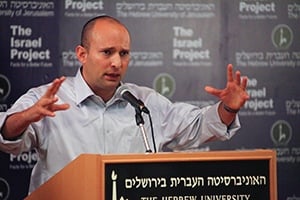Increasingly, people are questioning the feasibility of the two-state solution between the Israelis and Palestinians.
“Israel has already claimed about 60 percent of the occupied West Bank,” said Friends Center Director Max Carter. “Because of this alone, it is not possible to have a two-state solution.”
According to Israeli Minister of Economy Naftali Bennett, the time has come to rethink this solution. In fact, Bennett has proposed his own four-part plan.
The first part is an upgrade to the Palestinian autonomy in the West Bank, mostly in areas under Palestinian control. The second is an upgrade of roads and infrastructure, including the removal of roadblocks and checkpoints throughout the West Bank.
The third is to build a metaphorical ‘economic bridge of peace’ between Israelis and Palestinians in the hope that they could work together in pursuit of economic prosperity.
The final step would see Palestinians who live in an area controlled by Israel, under the Oslo agreement, offered full Israeli citizenship. By targeting just this area, Bennett feels it will make it easier to reach a long-term agreement in the future with Palestinian residents.
Unfortunately, many Palestinians believe this proposal will not go over well.
“Underneath all the glitz and glamour of this proposal’s supposed goodwill towards the Palestinians, it still maintains apartheid and occupation, albeit in a different guise,” said Associate Professor and Chair of English Diya Abdo in an email interview. “This guise makes the proposal very dangerous because when the Palestinians challenge this seemingly generous offer, they will be blamed for not wanting peace, and this will justify further attacks on the Palestinian population.”
This thinking is shared by many Palestinians who see this plan as a way for Israel to take advantage of them and as a way for Bennett to draw people’s attention away from the main problems.
“(Bennett) describes Arab communities as ‘fortresses of terror’ and reiterates the sentiment that the Palestinians and surrounding Arab nations need to wake up and agree to be peaceful,” said Student Success Mentor Faris El-Ali ‘14. “This ignores the root of the conflict. In short, Israel forcibly took control of historical Palestine, murdering and displacing hundreds of thousands of Palestinians and their families.”
Other Palestinians see this plan as a way for the Israeli Government to expand their settlements.
“(Bennett’s) quest for a new solution is not because of his advocacy for equal rights and justice for Palestinians,” says senior president of SJP in an email interview. “It is because of the commitment to the expansion of settlements and further entrenchment of the apartheid government of Israel.”
From the Israeli perspective, there does not appear to be much hope for a solution.
“I can’t speak for the Israeli public, but my sense is that there has been a shift to the ‘right’ in Israel,” said Carter. “Although the public is not on average as far-right as Bennett, there is a general pessimism about a long-term peace.”
Israeli journalist Gideon Levy, who been has been criticized by the Israeli public for being anti-Israeli and supportive of Palestinian radicalism, has his own opinion on Bennett and the proposal.
In an article published by Haaretz, Levy states, “With Bennett, both the world will know and Israelis will know what his goals are; with him Israel will no longer wear its lying, false, pretty face, which has allowed it to continue its policies. That’s why I’m for him.”







